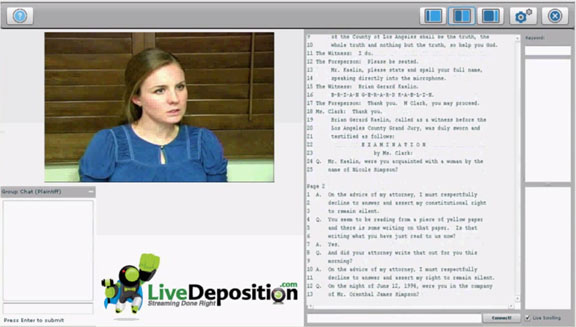The ongoing bankruptcy trial of Nortel Networks Corp. is groundbreaking in two ways. Not only is it the largest bankruptcy case in Canadian history, but it’s also the first trial to be simultaneously conducted in Canada and the United States, with lawyers, judges, and witnesses doing their work concurrently in Ontario and Delaware.

The technology behind the bi-national trial is made by Live Deposition, a company based in Southern California. The company first got involved with the Nortel case last year, when its service was used to provide depositions. But the trial itself is a first.
“I’ve never seen where two countries negotiate on two different sets of jurisdictional laws and rules and countries and at the same time chat on two different streams,” says Steven Genter, director of Live Deposition.
Genter, who has worked in the legal services industry for 15 years, designed and created the software, which was launched two years ago.
The software allows participants to stream and receive audio and video, get a live feed of court transcripts, upload and download documents, along with many other features. It can be run on PCs and Macs through a web browser and also functions on the iPad, Kindle Fire, or any Android-powered tablet.
While videoconferencing itself isn’t new to Canadian courtrooms — the Supreme Court of Canada began using satellite streaming back in the 1980s — the interactive elements of Live Deposition’s software makes it possible to have a simultaneous trial.
Genter says security and privacy are a large reason why lawyers and court reporters choose to use its software.
“Any of the chat messages are held in what’s called virtual memory on their device. That virtual memory disappears when you turn it off.”
Live Deposition is currently working on upgrading its suite of products to include an exhibit sharing software that would integrate with the rest of itsservices.
While some are still leery of using the type of technology offered by Live Deposition, Genter expects e-trials to become more commonplace in courtrooms as lawyers and judges become more comfortable with it.
“I think it’s five-year training curve until attorneys really understand that this is not a threat to their job.”
For now, he’s excited to see his software at work in the Nortel trial.
“It makes us feel good that $7 billion is riding on our product.”

 The technology behind the bi-national trial is made by Live Deposition, a company based in Southern California. The company first got involved with the Nortel case last year, when its service was used to provide depositions. But the trial itself is a first.
The technology behind the bi-national trial is made by Live Deposition, a company based in Southern California. The company first got involved with the Nortel case last year, when its service was used to provide depositions. But the trial itself is a first.